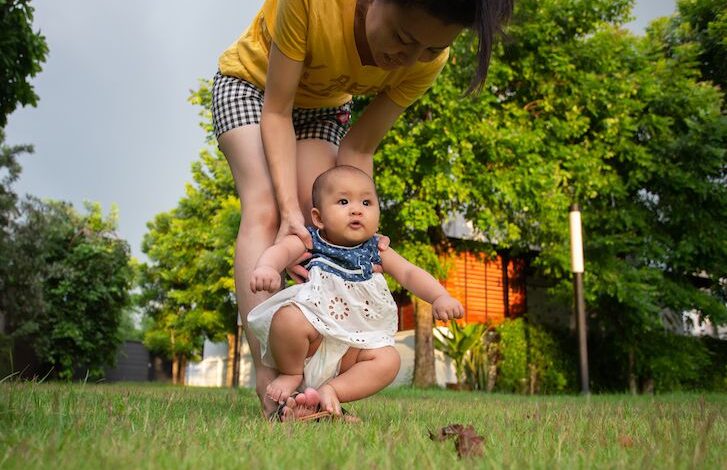Why do babies avoid grass? Experts explain the bizarre but adorable instinct

Videos of babies reflexively lifting their feet up before making contact with grass go viral for a reason — they’re adorable. That said, the behavior is perplexing nonetheless. Seriously, why do babies avoid grass? Scooting or running away before a diaper change — understandable. But grass? What gives?
“The reason some babies avoid grass is mostly sensory and texture related,” explains Dr. Steven Abelowitz, founder and medical director of Coastal Kids Pediatrics in Orange County, California. “The sharp, prickly, and at times tickly, texture of grass is most often uncomfortable and unpleasant for babies and usually far more so than the softer, comfortable features of carpets and wooden tile surfaces.”
Got a baby who morphs into a tiny gymnast the instant you try to place them down on the lawn? Here’s expert input on why it happens and what to do about it.
What are some common ways babies behave around grass?
Not all babies make every effort in their tiny bodies to avoid grass, but many do. Here are a few ways babies have reacted to grass. (Spoiler alert: This is hilarious and adorable.)
Some avoid grass altogether, like this:
Others “turn into a flamingo,” like this:
Others try to muscle their way through it, like this:
And some quietly seethe at their parents while curling up in a ball, like this:
So … what is it with babies and grass?
While there’s no distinct research as to why some babies are afraid of grass, it’s “most likely related to the fact that grass is a new object to explore,” notes Dr. Erynne Bowers, a pediatrician with Orlando Health Physician Associates.
“The texture and sensation of grass is different from what babies are used to,” Bowers says. “Most babies are familiar with their play mats at home, soft pillows and human skin. Grass, on the other hand, is bright in color, prickly and has a completely new smell.”
Abelowitz also speculates that there may be an evolutionary component to babies’ grass avoidance. He notes: “Babies could be hard-wired to be sensitive to potential dangers that stem from plants and grass, such as positioning and toxicity.” (Babies, after all, are born with a number of survival instincts.)
How do I get my baby used to grass?
Just because your baby recoils when you introduce them to grass, doesn’t mean you’re doomed for a lifetime of above-lawn splits (though they would have excellent core strength). According to Bowers, spending time outside with your little one often usually does the trick.
“When you’re outside together,” she adds, “explain the new environment to your child, allowing them to see that it is safe and controlled.”
Other tips for getting babies used to grass, according to Abelowitz, are:
- Pairing it with something they already enjoy. “Try laying a blanket on the grass and place baby on top of the blanket, allowing them to experience the feeling of grass beneath them while, in parallel, enjoying a positive playtime or feeding experience,” he says.
- Going slow. Take baby’s shoes off and slowly get them used to wiggling their toes in the grass — as opposed to plopping them down.
- Joining them. Abelowitz suggests parents and caregivers “sit down with them in the grass and play with them.” This, he says, will help condition babies and give them a positive association with grass.
What not to do when babies avoid grass
If you’re trying to take the fear out of grass for your baby, both Abelowitz and Bowers note, one thing not to do is force it.
“Parents should use gentle, repetitive and positive reinforcement, especially as babies look up to them for guidance and support,” Abelowitz notes. “Excessive force could lead to a development of insecurity and doubtfulness of their potential and abilities.”
When to speak to a doctor
With patience and teamwork, odds are your baby and grass will become good friends one day. That said, Abelowitz notes, if “the aversion to grass is becoming increasingly significant, prolonged or traumatizing to the child,” you should discuss the issue with your child’s pediatrician.
Additionally, Bowers adds, if being around grass is causing “rashes, hives or other significant reactions,” speak to your healthcare providers, as it may be a sign of an underlying allergy.
